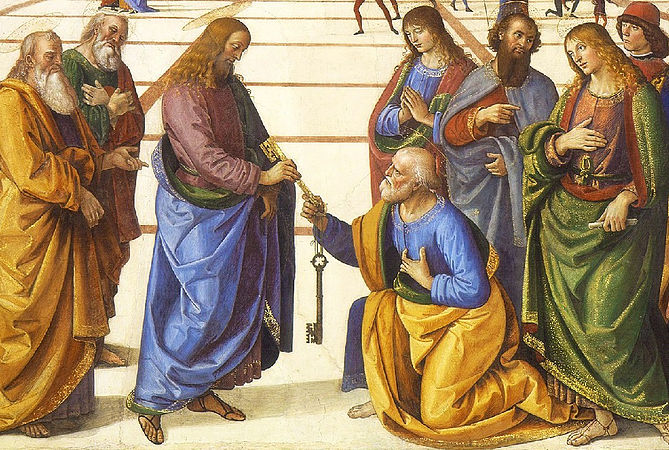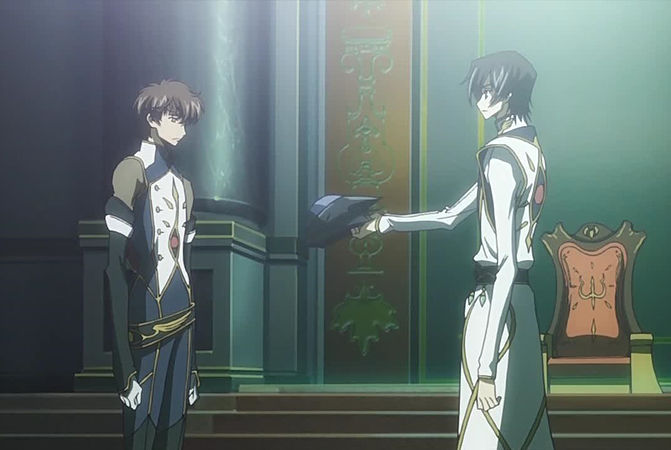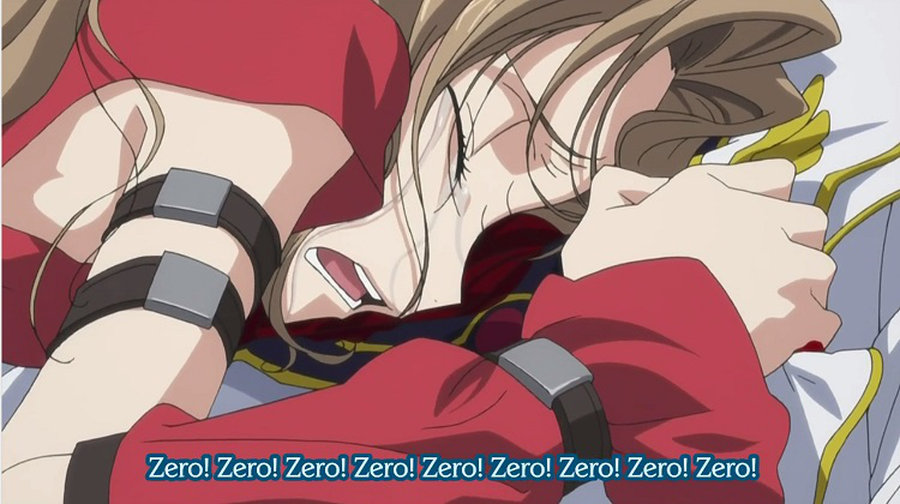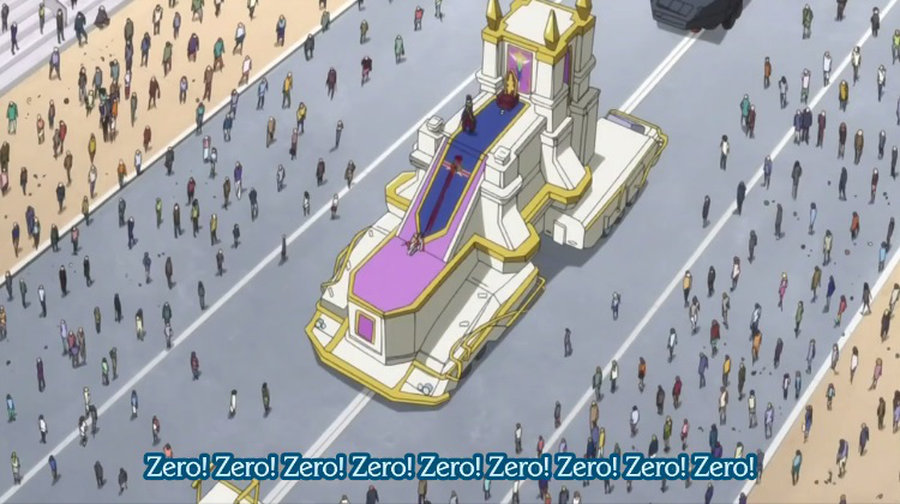This page is intended to debunked the top 3 most widespread (and easily refutable) false myths about Code Geass (and R2 in particular).
Myth No.1: "Lelouch's survival (implied by the Resurrection movie announcement) will forever ruin the ending of R2"
This is false for the simple reason that what really matters to the ending of R2, both storywise and thematically, is NOT Lelouch's death in itself.
In order to realize this one just has to ask himself: if the Zero Requiem was really just about Lelouch's death, why the need to orchestrate such a convoluted staging? More in detail, why let Lelouch be stabbed by Zero, of all people? The answer is: because Zero is the symbol of Lelouch's ideals of freedom that he tried to achieve in the world, ideals that got completely discredited by his many crimes and mistakes. Towards the end of the series Lelouch realizes to be rightfully hated by the whole world for what he has done, but also that were he to suddenly disappeared, his ideals would die with him, making all his sacrifices completely pointless, and leaving the world in the hands of another dictatorship. The true meaning behind the Zero Requiem is therefore to preserve those ideals (symbolically incarnated by Zero) from the one who made use of them for impure purposes (represented by the Emperor Lelouch) in order to protect the former while destroying the latter; how? By having it symbolically killed precisely by them.
The whole Zero Requiem is, in a nutshell, nothing more than a huge theatrical play, an allegorical representation in which Lelouch and Suzaku play determined roles in order to give the world a very specific message: that no ideal can ever lose its value because of the crimes of their self-appointed representatives, nor any of those crimes could ever be justified on the basis of those ideals; what Lelouch (and the whole anime) is trying to tell us is to always remain faithful to yours ideals, and never to the people, because while people are fallible and corruptible, ideals are eternal.
If we wanted to transpose that scene into a real world historical context, the equivalent would be like seeing Jesus Christ killing a pope, Voltaire killing Robespierre, or Karl Marx killing Stalin; and the latter one is especially fitting considering how the final confrontation between Lelouch's Holy Empire of Britannia and Schneizel's United Federation of Nations is a clear reference to the rivalry between USSR e USA during the Cold War period: in both cases we have on one side a stereotypical "evil empire" controlled with an iron fist by a single tyrant, on the other an alleged "good guy" falsely pretending to enforce democracy and peace by bombing innocents left and right; someone could object that such a statement is not fitting since, unlike the cited cases, Lelouch is not really a tyrant, on the contrary he was the one to give birth to Zero and to plan his own demise; but it should be pointed out once again, to avoid misunderstandings: the Zero Requiem is nothing more than a theatrical representation: its true meaning is entirely determined by what's being shown, not by what the actors are really thinking and/or doing; precisely for this reason, saying that R2's ending loses its meaning just because Lelouch isn't really dead, is literally like saying that a movie or a stage play featuring a death scene lose its meaning just because the actors playing that scene don't really die on stage.
From this we can see the absolute futility of the neverending diatribe that plagued Code Geass R2's ending for years: the one between those who believed Lelouch to be definitely dead, and those suspecting him to have somehow survived: regardless of what faction actually won in the end, both of them basically did nothing but look at the finger (Lelouch's alleged death) instead of the Moon (Zero Requiem's true meaning).
P.S.: There is also another point worth mentioning: Lelouch's "resurrection" perfectly fits the correspondence between Lelouch e Jesus Christ that arises during the ending: Suzaku being entrusted Zero's mask is nothing but a clear reference to Jesus handing the keys of Heaven's Kingdom to St. Peter, where in both cases we have a "prophet" entrusting his follower with an item as a symbol of the task of carry on his work even after his demise, while the statement "I... with my own hands... destroyed... and recreated... the world." clearly recalls the destruction and reconstruction of the "temple" mentioned in the Gospels. Lelouch's resurrection, by mirroring Jesus Christ's one, just reaffirms this correspondence, in this way gaining another meaning.
P.P.S.: As a further proof, it's interesting to point out how the trail of blood left by Lelouch after falling from the chariot during his death crosses the horizontal red stripe in Britannia's imperial banner creating a latin cross akin to the christian one. Coincidence?
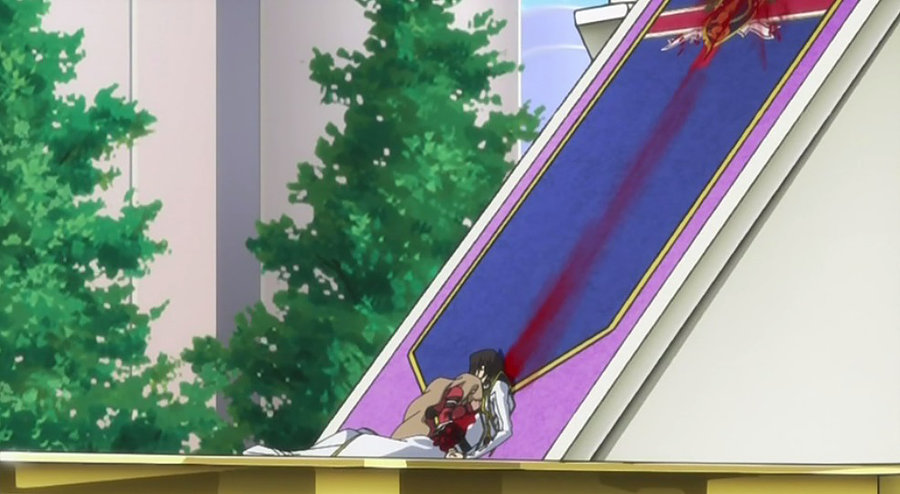
Myth No.2: "At the end of R2 Lelouch recognizes the foolishness of his ideals and learns that the end never justifies the means."
Clearly, once realized the true meaning of the Zero Requiem (see above), the idea that Lelouch simply "repents" or disavowes anything about his ideals crumbles like a castle of cards; how could Lelouch repent of his actions and/or ideals when his final objective was precisely to protect them and hand them down to the future generations? And how could the anime message be that "the end doesn't justify the means" when considering how the Zero Requiem itself is precisely another bloodshed for a higher purpose and, furthermore, that the most determined to follow that plan to the very end will turn out to be none the less that... Suzaku!? He who for 3/4 of the show wouldn't even kill a fly in order not to dirty his conscience? So much for "the end doesn't justify the means"! At first sight one would conclude the exact opposite: that Suzaku is the one who learned that "the end DO justify the means"! But clearly this would be just an equally biased and simplistic interpretation; in reality, what the series constantly reminds us is the stupidity of any simplistic "yes" or "no" type answer to such a complex question, and Lelouch and Suzaku are exactly the respective incarnations of such answers; the final reconciliation between Lelouch and Suzaku is not just a reconciliation between 2 characters, but also between 2 opposite extremist philosophies: in the end, Lelouch learn to have more respect for human life and not to treat people as mere disposable pawns; Suzaku recognizes the naivety of his idealism and the importance to dirty his hands when necessary (*); but no one of them ever repents of what they've done or disavowes their ideals in the slightest; the pink origami that appears in the last scene, the same that was shown during Lelouch's promise of a better world to Nunnally, is there precisely to remind us that, despite all the momentary failures, errors and sacrifices, his dream finally came true. Lelouch and Suzaku's tale is a tale of growth and redemption, not one of repentance.
All of this also entirely disproves another of the more frequent arguments about Lelouch's survival "ruining" the ending, i.e.: the idea that it would "contradict" his final redemption... this idea is based on the implicit assumption that Lelouch's main motive is the desire to commit suicide in order to redeem himself from his sins; however, if this really were the case, Lelouch's change could in no way be called a real growth: it would just be a shift from an extreme to the opposite one: in other words, it would be nothing more than becoming a replica of the old Suzaku. As we've seen, this is NOT the series' message. To sum up, what the series really wants us to ask ourselves is not *if* the end justify the means, but *what* ends justify *what* means. And, while the ideological struggle between Lelouch and Suzaku is a struggle around means, the one between Lelouch and Schneizel (or Charles before him) is a struggle around ends: all of them are united by the determination to make sacrifices for a higher purpose, but while Lelouch's purpose is a noble end such as the liberation of the world from war and oppression, Charles and Schneizel's one instead is the suppression of any real freedom and choice, ends that would've been unacceptable *in themselves*, regardless of the means used to achieve them.
(*) There's also a good reason to think that Suzaku's hatred against Lelouch is at least partially due to envy: for the vast majority of the series, Suzaku does little more than standing powerless as he watches Lelouch achieve one success after another; in fact, despite being a war criminal, Lelouch also made huge progresses: for example, he gave independence and hope to Japan, and created probably the first truly democratic power in the world; meanwhile Suzaku, despite all his advancements in the Britannian establishment, achieved nothing concrete except unwillingly making himself responsible for the death of millions of people... precisely what he wanted to avoid the most!
Myth No.3: "The love for Nunnally was just a pretext. Lelouch's real motive is the desire to get revenge against his father for his mother's death"
This is possibly one of the most baseless myth, considering both the complete absence of evidence in support of it, and the amount of evidence AGAINST it.
The fact that Lelouch has a strong (and vastly justified) desire for revenge is obviously beyond doubt; the idea that this desire is the main force behind Lelouch's actions, on the other hand, is a complete nonsense which clashes with the most blatant evidence: just think about those times when Lelouch is almost on the verge of ruining all of his plans precisely for the sake of Nunnally: just think about the episode "The abandoned mask" in which Lelouch seriously considers aborting all of his work just because of Nunnally's refusal; or also, immediately after Nunnally's presumed death, when due to the shock Lelouch bursts out at his underlings how he basically viewed them as little more than disposable pawns for Nunnally's sake. Where, on the other hand, is the evidence that all of this is nothing more than a pretense to hide his desire of revenge?
They're simply nonexistent (*). Lelouch only decides to settle the matter with his father once and for all at the very end, out of desperation, after losing both Nunnally, his underlings, and any chance to fulfill his ideals; in other words: when he's already lost every other reason left to keep living (so strong is the desire to avenge his mother that, just a few minutes after seeing her coming back to life just in from him... he kills her! And for what reason? Again, because of the troubles that she, together with his father, caused to him and to Nunnally).
Does this mean that all Lelouch's ideals of justice up to this point were nothing more than an pretense? Not at all, his ideals were 100% sincere; however, whenever those two come into conflict, it's always Nunnally to pravail. There's nothing contradictory in this fact as some might think, on the contrary, is precisely this tension between the world's greater good and his personal desires that highlights the complexity and humanity of Lelouch's character: everyone has ideals and moral principles they'd like to see achieved, but also personal desires and affections that, for the vast majority of people, take the precedence.
Understanding this is of fundamental importance in order to properly understand not only Lelouch's character, but also the anime's very message: the main goal of Lelouch's growth as a character lies precisely in his realization of his responsibility towards the whole world and not only towards Nunnally, and in finding the strength to go on even against his personal desires for the sake of the whole world. Said redemption will be ultimately certified in the final scene where, in an ironic reversal of his intents during the series, the only one crying is precisely Nunnally, while the rest of the world rejoices for his death!
(*) Regarding the question that Suzaku asks Lelouch immediately after Charles' demise: "How long do you intend to continue using Nunnally as an excuse?", the term "excuse" should not be intended as in "pretense", but rather as in "justification": what Suzaku really means to say is not: "how long do you intend to continue using Nunnally as a pretense to cloak your true motives?", as many believe, but rather: "how long do you intend to continue thinking of Nunnally as a valid justification for your crimes?"

First published: before 2018.
Last edit: 13/06/2020.

